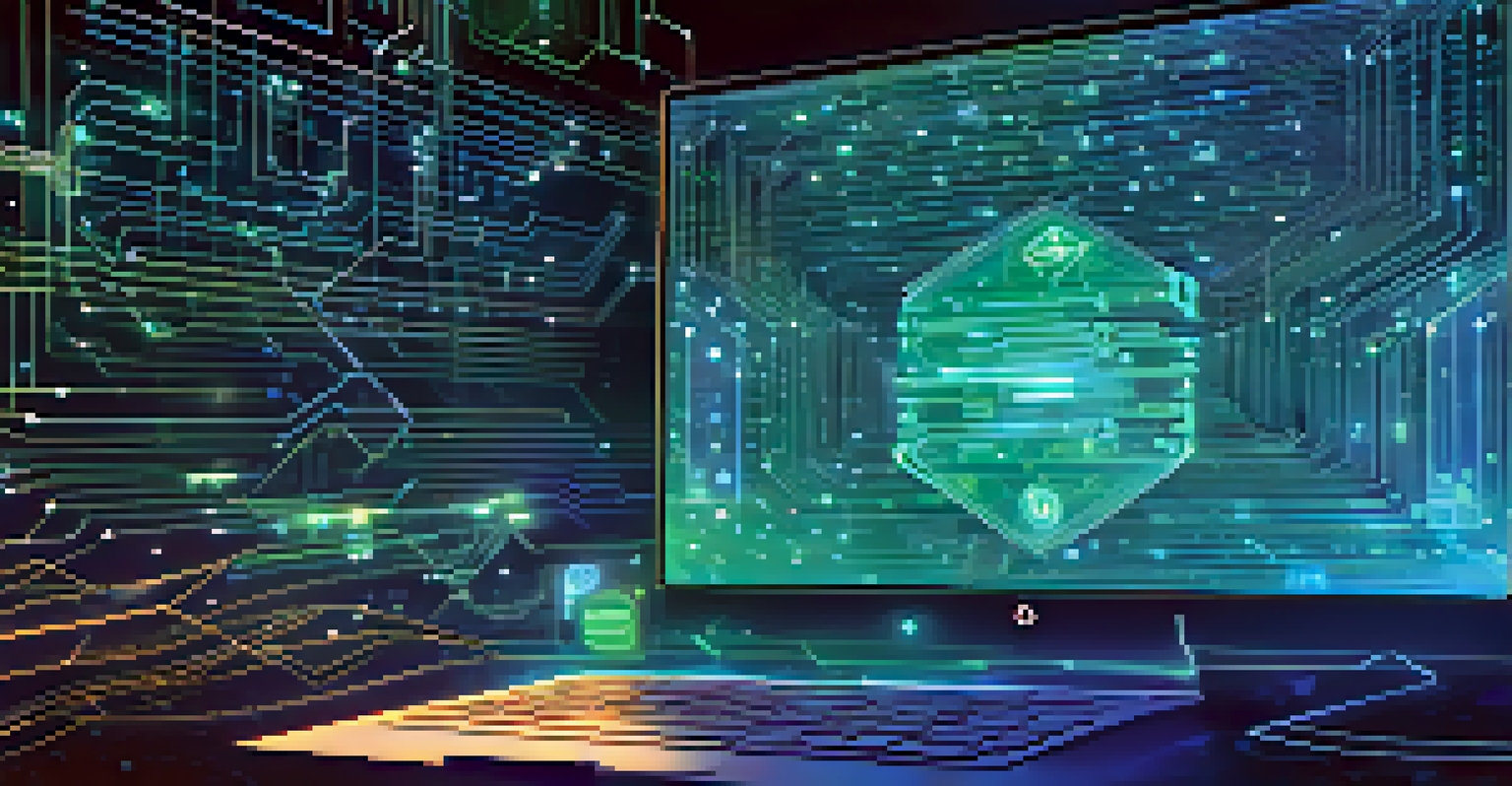The Role of Smart Contracts in NFTs and DeFi Integration

Understanding Smart Contracts in Blockchain Technology
Smart contracts are self-executing contracts with the terms directly written into code. They operate on blockchain technology, ensuring transparency and security. Imagine them as digital vending machines: you put in your money, select your item, and the machine automatically delivers it without a middleman.
Smart contracts are the digital equivalent of a handshake agreement, facilitating trust and transparency in transactions.
These contracts run on decentralized networks, which means they don’t rely on a central authority, making transactions more efficient. By eliminating intermediaries, smart contracts reduce costs and speed up processes. This is particularly valuable in industries like finance, where time is often money.
In the context of NFTs (Non-Fungible Tokens) and DeFi (Decentralized Finance), smart contracts enable unique functionalities. For instance, they can facilitate the creation, sale, and transfer of NFTs while ensuring ownership rights are securely recorded on the blockchain.
The Intersection of NFTs and Smart Contracts
NFTs have gained immense popularity as unique digital assets, often representing artwork, music, or even virtual real estate. Smart contracts play a crucial role in the NFT ecosystem by defining the ownership and transfer processes. Think of them as the guardian of your digital treasures, ensuring they are safely and accurately traded.

When an NFT is created, a smart contract is deployed to handle its attributes, ownership, and transaction history. This guarantees that each token is unique and verifiable, addressing the issue of counterfeit digital art. An example of this can be seen in platforms like OpenSea, where smart contracts manage the buying and selling of NFTs seamlessly.
Smart Contracts Enable Efficiency
By automating transactions and eliminating intermediaries, smart contracts streamline processes in industries like finance.
Moreover, smart contracts can also embed royalties into NFTs, allowing creators to earn a percentage from future sales. This innovative approach not only incentivizes artists but also revolutionizes how royalties are handled in the digital space.
DeFi and Its Growing Importance in the Digital Economy
Decentralized Finance, or DeFi, refers to a financial system built on blockchain technology that operates without traditional intermediaries like banks. It allows users to lend, borrow, trade, and earn interest on their assets through decentralized applications (dApps). This democratization of finance opens up a world of opportunities for individuals worldwide.
The future of finance is decentralized, and smart contracts are the key to unlocking its potential.
DeFi platforms leverage smart contracts to automate financial transactions and enforce agreements without the need for third-party intervention. For example, when you lend your crypto on a DeFi platform, a smart contract ensures that your terms are met and that you receive your interest payments automatically.
As DeFi continues to grow, it challenges conventional finance by offering higher returns and greater accessibility. This shift is particularly appealing to those who may be underserved by traditional banking systems, creating a more inclusive financial landscape.
How Smart Contracts Facilitate DeFi Transactions
Smart contracts are the backbone of DeFi transactions, managing everything from lending protocols to liquidity pools. They ensure that transactions are executed only when predefined conditions are met, adding a layer of security and trust. Picture a smart contract as a trustworthy referee in a game, ensuring all players follow the rules.
For instance, if you want to borrow funds using your crypto as collateral, a smart contract will lock your assets until you repay the loan. This automated process minimizes risk for lenders while providing borrowers with quick access to funds. It’s this level of automation that makes DeFi so efficient.
NFTs Rely on Smart Contracts
Smart contracts ensure the uniqueness and ownership of NFTs, making them secure and verifiable digital assets.
Moreover, smart contracts can facilitate complex financial products, such as derivatives and options, without needing a centralized exchange. This innovation empowers users to create tailored financial strategies that suit their unique needs.
Challenges and Risks of Smart Contracts in NFTs and DeFi
While smart contracts offer significant advantages, they are not without challenges and risks. One of the primary concerns is the potential for coding errors or vulnerabilities, which can be exploited by malicious actors. This risk is akin to leaving a door unlocked; if you don't secure your code, it can lead to significant losses.
Additionally, the complexity of smart contracts can be overwhelming for new users, leading to misunderstandings or mistakes during transactions. Educating users about how smart contracts work is vital for fostering trust and encouraging widespread adoption.
Finally, the regulatory landscape for NFTs and DeFi is still evolving. As governments and regulatory bodies begin to catch up with this technology, potential legal implications could impact how smart contracts function in the future.
The Future of Smart Contracts in NFTs and DeFi
The future looks bright for smart contracts, especially as they continue to evolve alongside NFTs and DeFi. Innovations like layer-2 scaling solutions promise to enhance transaction speed and reduce costs, making these technologies more accessible to the average user. Imagine a world where you can trade digital assets instantly at minimal fees.
As developers continue to explore new use cases, we can expect to see increasingly sophisticated smart contracts that can handle more complex interactions. This could lead to entirely new financial products and services that we haven’t even imagined yet.
DeFi Revolutionizes Finance Access
Decentralized finance uses smart contracts to democratize access to financial services, providing opportunities for those underserved by traditional banks.
Ultimately, the integration of smart contracts into NFTs and DeFi is paving the way for a more decentralized and transparent financial ecosystem. Embracing these technologies could empower individuals and foster a more equitable economy for all.
Conclusion: Embracing the Potential of Smart Contracts
In conclusion, smart contracts are at the heart of the NFT and DeFi revolution, enabling secure, transparent, and efficient transactions. They eliminate intermediaries, empower creators, and democratize access to financial services. This shift is akin to moving from a horse-drawn carriage to a high-speed train—it's a game-changer.
As we continue to navigate this digital landscape, understanding how smart contracts work is essential for anyone looking to participate in the future of finance and digital ownership. The more informed we are, the better equipped we’ll be to harness the potential of these technologies.

By embracing smart contracts, we can pave the way for a more inclusive and innovative financial ecosystem that benefits everyone, not just the select few.